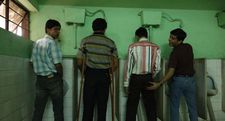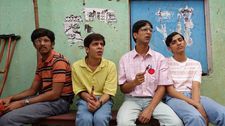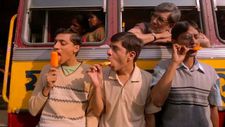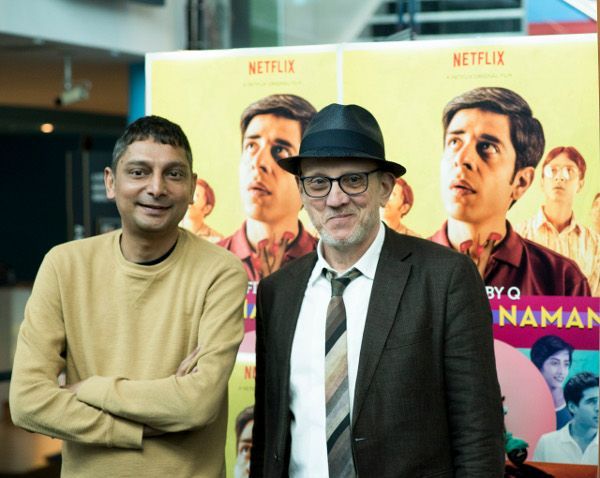Amber Wilkinson: Watching this film felt like a step back in time to when I was a teenager myself. I gather it's partially drawn on your life?
Naman Ramachandran: It is informed by some incidents in my past life. Obviously, it's heavily fictionalised for obvious reasons. But some of these things did happen.
AW: Should I ask about the welfare of the family fish?
Steve Barron: That was made up, surely?
NR: No it wasn't
SB: But what about the big rider at the front of the film?
NR: In the beginning of the film it says that everything is fictionalised and it is - but you write what you know. It is drawn from real life and the fish flourished and the person who subjected the fish to this in real life is now a very successful restaurateur, who owns about 25 restaurants.
SB: Are they fish restaurants?
 |
| Ramachandran: 'There was nothing on TV, obviously, there was no internet, no smartphones and you would fight for the one copy of the girlie magazine that would go around' |
SB: It's the application, I think, of these brilliant teenagers. They're obviously just applying themselves to this and being quite imaginative.
NR: Also, back in the Eighties in India, there was an almost complete lack of stimuli. If you look at today, you have your smartphones, you have the internet, you have access to all sorts of pornographic imagery. Back in the day, you tried to sneak into a cinema for a film that had one or two sex scenes. There was nothing on TV, obviously, there was no internet, no smartphones and you would fight for the one copy of the girlie magazine that would go around. So they had only their imagination and nothing else.
AW: So was that what drew you to that period, because it was more closed off as an idea?
NR: Both Q and I grew up in the Eighties and there is no cinematic record of English-speaking Indian boys at that time. Thousands of Indian films were made in the Eighties but that particular snapshot of time in life has never been captured on film.
AW: Can you tell me a bit about how you came to be involved in the project, Steve?
SB: I was working in Bangalore, we were actually developing another project. Naman told me about this plan and what he was saying about the snapshot of the English-speaking quizzers of India at the time and their loving of Western culture and particular music and that really got me interested. The more Naman said about it the more I said, "Put it down on paper, this could go somewhere, this could be interesting." He writes so fearlessly and honestly.
AW: The music is incorporated into the film in an interesting way, it feels to me quite specifically Indian in the way that they sort of half break into song in the middle of things, it feels almost like a nod to Bollywood, was that the intention?
NR: No, it wasn't because today everybody celebrates Bollywood but while growing up you must know that the Eighties was the worst time for Indian cinema. It's kind of a black decade, so we didn't grow up idolising Bollywood like the kids today do. So, almost all our frames of reference were Western. The soundtrack to that was also very Western - mainly British rock and 90 per cent of those videos were directed by Steve Barron.
SB: I'm not that old. You were talking about the Foreigner and Rod Stewart.
NR: Ah yes, that's before your time.
AW: There was quite a bit of Seventies music in there as well, I presume that's because music stuck around a lot longer at that time than perhaps it does today.
 |
| Naman Ramachandran: 'In the beginning of the film it says that everything is fictionalised and it is - but you write what you know' |
AW: Are you a quizzer yourself?
NR: I was a very active quizzer until I left India around 20 years ago. Then I moved to Singapore, I used to do some pub quizzes and stuff. Then when I moved to the UK in 2000, when I came up to do my Masters in Stirling, I used to do some film quizzes there as well but then life got in the way. I'm active in that every time there's a big quiz in India, they ask me for film and music questions. That's my speciality and I send them some really tough ones.
AW: In terms of how it came together, how do you feel when you hand it over to the director, are you worried about giving it up to him or do you look forward to seeing what happens to it?
NR: In this case, it was a very collaborative process because both Steve and Q wanted me to be involved right through the project, not just write it and go away. So, I was involved in the casting. I was involved in the workshops that we did with actors, so I was a diction coach in a sense. The actors came from all over India but we wanted them to have the right Bangalore accent, so we told them to observe me and listen to how I speak and to slow it down a bit because Indians tend to speak English very rapidly. We wanted international audiences to understand the English.
AW: Did you feel the benefit of having Naman there.
SB: Yes, we felt that it was really important that Naman was there and that the voice from the film stayed strong. Q had some great ideas, a little bit more politics and worked other ideas and themes in.
AW: The caste system is very interesting in this film - it's not something you normally see presented in a comedy film.
NR: The caste system is just a backdrop really because if you're born Hindu in India, your life is defined by which caste you're born into and it's been like that for 5,000 years. We didn't want to hammer home anything, we just wanted to say that these boys are from that particular caste and, why that particular caste? Because Q and I are from it so we no it well. So rather than look at a caste we don't belong to we just look at our own and had a laugh.
AW: It's still problematic in India, do you feel there's still a long way to travel
NR: There has been some reform but it's just skin deep. If you scratch the surface it's all there. You probably won't see it in the urban centres but if you go slightly below the so-called liberal middle classes, it's there.
AW: Was the casting process difficult?
NR: I think Steve kicked it off two years before we shot it.
 |
| Naman Ramachandran: 'It was a very collaborative process because both Steve and Q wanted me to be involved right through the project, not just write it and go away' |
NR: A bit of it was very good fortune. Two days before the shoot, the actor who was supposed to play Randy dropped out. Then we did an open casting call in Bangalore, and Vaishwath Shankar, from Chennai, walked in. He didn't open his mouth, the moment we looked at him, we said: "He's the one."
AW: Are you still working on the project that you were originally doing together?
SB: We might do it one day, this one was always more commercial.
NR: It's a lovely project. It's very close to my heart because we worked on it for years.
SB: It's called Prakash and it's about a little boy who, at the age of eight, finds out he was adopted. He's told a bit late, by the age they tell you in India, in particular, and it freaks him out. He steals some money and runs away with a rickshaw driver who normally takes him to school, who takes him to see stars out of the city. It's about clarity - because Prakash means clarity - we started on it maybe 10 years ago. It was a real anti-pollution message underneath it all because it was about to come in and control us all and the need to see more clearly.
AW: There has been a rise in more mainstream cinema coming from India to British cinemas recently, less Bollywood, more drama.
SB: There's certainly a wave of Indian directors coming through.
NR: If you look at Ritesh Batra's The Lunchbox, it was a global and his next film is a British film, The Sense Of An Ending, based on the novel by Julian Fellowes. The only thing about that film that is Indian is the director. He's telling a British story.
AW: Yes, and Indian directors are also telling fresh stories from India, such as last year's drama Titli, which also stars Shashank Arora, who plays Naman. He's a very versatile actor.
NR: He is. His next film is going to be Rock On!! 2, a sequel where he plays a classical musician who is co-opted into a rock band. Then he is in The Song Of Scorpions alongside Golshifteh Farahani, so he's going places.
AW: How do you feel about it going to Netflix as a way of distribution?
SB: I love it. It's the new way. To get it out there properly. In two weeks' time (July 7) it's going to be available in 190-odd countries on one day. How amazing is that for filmmakers who want to get the word out.
NR: I've seen independent filmmakers and so has Steve, who have worked on a film and then gone to big festivals. Then, through sales agents, they try to dripfeed their film territory by territory and this whole process takes two years and at the end of it, they still don't turn a profit. This way, the whole world gets to see it and we've already moved on to our next project.
Brahman Naman launches on 7 July, exclusively on Netflix.
Watch the trailer:






















